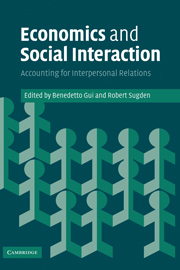Book contents
- Frontmatter
- Contents
- List of illustrations
- Notes on contributors
- Preface
- 1 Why interpersonal relations matter for economics
- 2 From transactions to encounters: the joint generation of relational goods and conventional values
- 3 Fellow-feeling
- 4 Interpersonal interaction and economic theory: the case of public goods
- 5 Under trusting eyes: the responsive nature of trust
- 6 Interpersonal relations and job satisfaction: some empirical results in social and community care services
- 7 On the possible conflict between economic growth and social development
- 8 The logic of good social relations
- 9 The mutual validation of ends
- 10 Hic sunt leones: interpersonal relations as unexplored territory in the tradition of economics
- 11 Authority and power in economic and sociological approaches to interpersonal relations: from interactions to embeddedness
- 12 Interpersonal relations and economics: comments from a feminist perspective
- 13 Economics and interpersonal relations: ruling the social back in
- Envoi
- References
- Index
13 - Economics and interpersonal relations: ruling the social back in
Published online by Cambridge University Press: 15 December 2009
- Frontmatter
- Contents
- List of illustrations
- Notes on contributors
- Preface
- 1 Why interpersonal relations matter for economics
- 2 From transactions to encounters: the joint generation of relational goods and conventional values
- 3 Fellow-feeling
- 4 Interpersonal interaction and economic theory: the case of public goods
- 5 Under trusting eyes: the responsive nature of trust
- 6 Interpersonal relations and job satisfaction: some empirical results in social and community care services
- 7 On the possible conflict between economic growth and social development
- 8 The logic of good social relations
- 9 The mutual validation of ends
- 10 Hic sunt leones: interpersonal relations as unexplored territory in the tradition of economics
- 11 Authority and power in economic and sociological approaches to interpersonal relations: from interactions to embeddedness
- 12 Interpersonal relations and economics: comments from a feminist perspective
- 13 Economics and interpersonal relations: ruling the social back in
- Envoi
- References
- Index
Summary
Humans are social animals. Being animals we are biological organisms imbued with the drive to maintain ourselves by consuming food and sheltering ourselves from the elements. Being social, we are physically, intellectually and emotionally interdependent. We are born helpless and need others' nurturing. We are born at all because our parents are moved by desires for intimate relations. We are cared for because they are endowed with the drive to nurture us and with tendencies to bond to each other to facilitate such nurturance. We learn to think – to converse with ourselves mentally, using words – only by interacting with one another, using languages that are the products of millennia of such interactions. Our senses of self emerge in our early encounters with others, and we construct identities by comparing ourselves with others and apprehending our places in a social order. How odd that we should ever have thought up a social science that gives short shrift to social interactions!
About twelve thousand years ago our ancestors, who had recently begun to fashion more elaborate tools, started to exploit their environments in new ways. The old lifestyles of hunting and gathering gradually gave way to new ones based on agriculture and animal husbandry. As technological progress fed population growth, more differentiated divisions of labour came into being and the intimate band gave way to the more complex village and to still larger societies and polities. Little by little, the self-sufficiency of the band gave way to specialisation and trade.
- Type
- Chapter
- Information
- Economics and Social InteractionAccounting for Interpersonal Relations, pp. 262 - 269Publisher: Cambridge University PressPrint publication year: 2005



